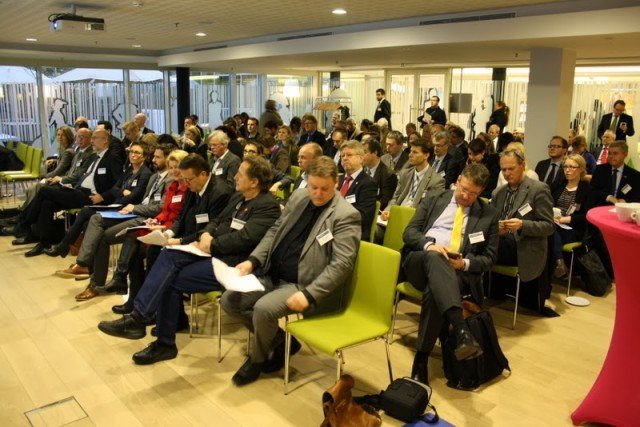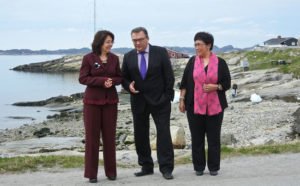The Arctic Dialogue in Brussels: Are we talking about the same ‘Arctic’?

Photo: Torjus Kandal
The number of Arctic seminars in Brussels seems to increase in parallel with the decrease of Arctic sea ice every year. Despite this swell of discussion, the rhetoric used by the different ‘Arctic-camps’ is often so divergent that one can even question if we are all talking about the same geographical region. A prime example of this is how debates concerning sovereignty and oil and gas in the Arctic are, at least from a Norwegian or Russian point of view, out of touch with current realities.
As pointed out in recent articles by The Arctic Institute, both the Environment Committee in the European Parliament and the Environment Audit Committee in the British Parliament have called for a ban on Arctic offshore oil and gas activities in the last few weeks. Greenpeace has made its presence felt very strongly in this arena lately, with protests and demands for a halt in Arctic drilling.1) Additionally, the French oil multinational Total went public and expressed concern about oil drilling in the Arctic (perhaps no surprise given that Total only has gas projects in the Arctic).2)
The topic of sovereignty and ‘who owns what’ has been on the Arctic agenda for some years now. Petroleum has, as a consequence of increased activity in 2012, also become the new hot topic this summer, especially as it intertwines with some sovereignty issues. Politicians located far away from the region are suddenly voicing strong opinions on the matter, as we see clean ice portrayed against slick black oil in the media – a typically provocative Arctic visual.
However, at the Arctic Futures Symposium 2012 in Brussels the tone from Russia and Norway, which make up the European part of the Arctic coastal region, implied that such disputes are irrelevant given the countries’ “exclusive rights” in the area.3) The Russian deputy permanent representative to the EU spelled it out clearly, stating that in Russia, “Arctic is the reality, and not a no-man’s land”, while contributing to an impressive 22% of Russia’s exports.4) Norway’s Ambassador to the Arctic was equally as clear, highlighting how the Arctic has been misunderstood in view of a ‘legal vacuum’ and unclear jurisdictions, as well as in terms of oil and gas.

The EU, on the other hand, represented by the Commissioner for maritime affairs Maria Damanaki, used a different type of rhetoric about the Arctic being “part of the global commons, where we [the EU] have a stake”.5) Does this then imply that Norwegian or Russian Arctic territories are part of the global commons? And are these the same commons that Chinese authorities keep referring to when legitimizing their own engagement in the region?6)
Naturally, boundaries between the areas of ‘exclusive rights’ and the areas of ‘global commons’ do exist in the Arctic. Appropriate usage of such boundaries, however, is notably absent in general debate, at least in Brussels. It seems misguided and inherently contradictory that Commissioner Damanaki should refer to the Arctic as a global common while Klepsvik simultaneously emphasises Norway’s exclusive Arctic rights. The fact of the matter is that Damanki and Klepsvik are not approaching the issue of the Arctic sovereignty in the same way, or even talking about the same thing.
Currently, upper parts of the Arctic Ocean, or the ‘High Arctic’ surrounding the North Pole, are not subject to any national jurisdiction. Claims to the seabed under the North Pole have and will be filed to the International Seabed Authority under UNCLOS, so this situation might change. At the moment, however, there are two parts of the Arctic region, namely: the ‘global commons’ made up of the ocean surrounding the North Pole, and the individual national areas both onshore and offshore that belong to the sovereign Arctic littoral states. And even the latter part is not one coherent region, but consists of multiple sub-regions with very different climates, ice conditions (or lack thereof) and populations. Stating all these facts might not sound as sexy as just ‘The Arctic’, but it would help make the debate more nuanced and informed.
Inaccuracies also persist in discourse on oil and gas, and subsequent moratoriums. Actors such as Greenpeace and the environment committee in the European Parliament tend to refer largely to Greenland and the coast of Alaska when proposing a ban on oil and gas activities. The coasts of North-Norway and North-West Russia, on the other hand, are barely mentioned, despite being the parts of the Arctic where offshore oil and gas development is expanding most rapidly.
The Urengoy, the Yamburg and the Zapolyarnoye gas fields in the Russian Arctic have been producing gas since 1978, 1986 and 2001. Together with the development of Bovanenkovo, these fields comprise the backbone of the Russian gas export to Europe.7) Developments in the Russian Arctic, and to some extent Norway, will remain crucial to the energy mix of some EU member states in the foreseeable future.
However, having neither the authority nor competence to meddle in Arctic petroleum affairs – as pointed out by the Norwegian Deputy Petroleum and Energy Minister Rune Henriksen – it seems European actors would rather raise concern from afar about Arctic oil and gas developments in Greenland or Alaska than aggravate close neighbours Russia or Norway.
Maybe European Parliamentarians are acknowledging that most of the gas coming to Europe from Russia originates in the Russian Arctic. Or maybe there is just a general lack of knowledge amongst some of those vocalising on this topic. Again, keeping the debate informed should have first priority as we discuss Arctic oil and gas in relation to topics of sovereignty. Recognizing that calls for a precautionary moratorium on Arctic oil and gas often target the ‘High Arctic’, even as oil and gas activities in parts of the ‘Low Arctic’ continue to expand, is a necessary first step.
References